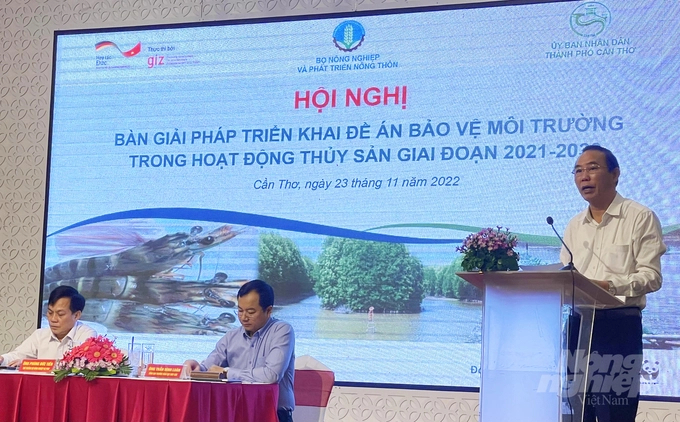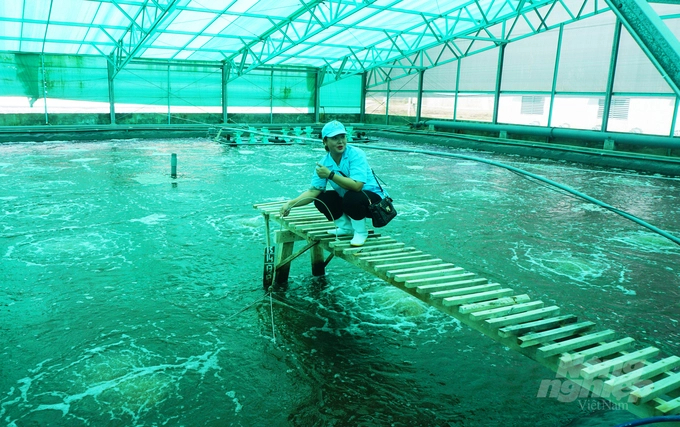June 16, 2025 | 07:56 GMT +7
June 16, 2025 | 07:56 GMT +7
Hotline: 0913.378.918
June 16, 2025 | 07:56 GMT +7
Hotline: 0913.378.918

Deputy Minister Phung Duc Tien: Sustainable and responsible fisheries development is an inevitable trend of the integration process. Photo: Huu Duc.
On November 23, MARD coordinated with the People's Committee of Can Tho City to hold a conference to discuss solutions to implement the environmental protection project in fisheries activities in the 2021-2030 period. Representatives of international organizations in Vietnam together with central and local ministries, branches, associations, businesses, and science and technology organizations participated in the discussion and contributed ideas.
Deputy Minister Phung Duc Tien emphasized that Vietnam's seafood industry has become one of the key economic sectors, bringing the third largest export value in the country's economic sectors. The industry is identified as one of the five key marine economic sectors in the Vietnam Maritime Strategy for 2030.
However, despite the rapid growth of the seafood industry, in the development process, it is facing many environmental problems. Those problems are Climate change and increases in sea levels, especially in the Mekong Delta.
Aquaculture production activities have been generating waste, affecting the environment, and not having many mitigation measures. Waste treatment systems and equipment from fisheries activities have not been properly invested and cared…
According to the recognition and assessment of specialized agencies, fisheries is a production industry strongly affected by environmental pollution. It is also a production industry that causes environmental pollution.
It is estimated that the total amount of plastic waste generated by fishing vessels with a length of 6m or more in the whole country is about 64,100 tons per year. In which the amount of plastic waste lost to the sea is about 3,800 tons per year (accounting for 5.6%).
The amount of waste in the sea is mainly from domestic sources (accounting for 60%, about 2,288 tons/year) and a part of the passively lost fishing gear (31%, about 1,182 tons/year) during fishing. According to the statistical results of shipping activities at sea, the amount of wastewater from cleaning ships and fishing boats is about 535,000 m3/year (about 1,465 m3/day). The estimated amount of waste generated from cleaning and repairing water for fishing vessels in 2020 with 94,572 fishing vessels is about 3,782,880 l/day…

Viet Uc Group (Bac Lieu) raises shrimp with high technology, water circulation, waste control, and environmental protection. Photo: Huu Duc.
The development of the fishery industry, from exploitation, farming, and processing industry, has changed a lot. In fact, some waste, plastic ... at fishing ports, and fishing vessels operating at sea, and operating in some fishing ports have not yet been treated and collected.
In recent years, although there have been positive changes, the application of environmental quality management measures, TCVN, environmental QCVN, and economic tools still have many obstacles. They are difficult to apply in practice and cannot keep up with the rapid development of production. The circular economy models and green economy are in the new seafood value chain in the initial development stage. They have not yet become the driving force to create the power for sustainable development of the whole chain...
Deputy Minister Phung Duc Tien affirmed that sustainable and responsible aquaculture development is an inevitable trend of the integration process. The Prime Minister approved the project on environmental protection in fisheries activities in the period 2021-2030 in Decision No. 911/QD-TTg (July 29, 2022). The project comes with many contents and solutions towards the goal of improving environmental quality in the fisheries industry and protecting people's health.
Modern models and technologies are deployed in the environmentally friendly production process in recycling and waste treatment. Monitoring, warning, and forecasting activities on environmental quality have been enhanced, providing information on the environment, and serving well for socio-economic development and community health protection. Therefore, the project needs to be organized and implemented in a synchronous and effective manner throughout the provinces and cities across the country. This will help develop the fisheries industry sustainably.
"From the recommendations and proposals through management and production practices, localities need to have action plans for the conservation and protection of aquatic resources. They need to manage well the quality of water supply and wastewater in aquatic production activities, develop and replicate environmentally friendly forms of ecological aquaculture", Deputy Minister Phung Duc Tien said.
Translated by Hoang Duy
![Turning wind and rain into action: [4] Bringing climate bulletins to remote and isolated areas](https://t.ex-cdn.com/nongnghiepmoitruong.vn/608w/files/linhnhp/2025/06/14/1152-z6704423696987_15fd32ffc26d590d204d520c9dac6786-nongnghiep-151141.jpg)
(VAN) The Vietnam Agriculture and Nature Newspaper interviewed Mr. Vu Thai Truong, Acting Head of Climate Change and Environment at UNDP Vietnam, to gain deeper insight into how climate bulletins are delivered to farmers.

(VAN) In Tien Giang, a high-tech shrimp farm has developed a distinctive energy-saving farming model that has yielded promising results.
![Turning wind and rain into action: [3] 300.000 farmers benefit from agro-climatic bulletins](https://t.ex-cdn.com/nongnghiepmoitruong.vn/608w/files/news/2025/06/12/e5a48259d6a262fc3bb3-nongnghiep-125122.jpg)
(VAN) The agro-climatic bulletin has become a valuable tool for farmers in the Mekong Delta. After more than five years of implementation, the initiative is gradually being expanded nationwide.
![Turning wind and rain into action: [2] Providing forecasts to the people](https://t.ex-cdn.com/nongnghiepmoitruong.vn/608w/files/news/2025/06/12/e5a48259d6a262fc3bb3-nongnghiep-103927.jpg)
(VAN) In addition to improving the quality of hydrometeorological forecasts, putting forecast bulletins into practical use is crucial for production and disaster prevention.

(VAN) Blue carbon is receiving attention for its rapid absorption capacity and vast potential. It represents a promising nature-based solution to respond to climate change.
/2025/06/11/3507-1-161904_583.jpg)
(VAN) Seagrass beds and coral reefs serve as 'cradles' that nurture life in the ocean depths, creating rich aquatic resources in Vietnamese waters.
![Turning wind and rain into action: [1] Forecasting for farmers](https://t.ex-cdn.com/nongnghiepmoitruong.vn/608w/files/news/2025/06/11/e5a48259d6a262fc3bb3-nongnghiep-111919.jpg)
(VAN) Weather is no longer just a matter of fate. Forecasts have now become an essential companion for farmers in every crop season.